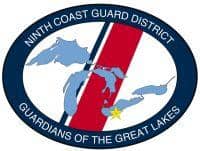Coast Guard Reminds Hunters and Anglers of Fall Dangers Around Water
OutdoorHub 10.25.13

It’s that time of the year again, and the Coast Guard wishes to remind those who choose to recreate outdoors throughout the Great Lakes region to keep safety their number one priority.
Every year, hunters and anglers find themselves in danger and in need of assistance on the water.
To have a safer, more enjoyable hunting or fishing excursion and to minimize risk, the Coast Guard recommends that you follow these simple, and potentially lifesaving, tips:
- Wear your life jacket. Once you are in the water, it is much more difficult to put it on.
- Don’t overload your boat. Refer to the vessel’s capacity plate and review the manufacturer’s recommendations. Don’t forget to account for your hunting or fishing gear. Also keep your four-legged companions in mind, too.
- Minimize your movement around the vessel. Not only can movement frighten what you’re trying to hunt, it can potentially capsize your vessel. Capsizing, sinking or falling overboard from small boats account for upwards of 70% of all boating fatalities.
- Know the weather forecast. Weather in the maritime environment can change rapidly. Seek immediate shelter if you encounter stormy conditions.
- Tell a trusted person where you are going and when you plan to return. Update your plan if things change. More information is available at the Coast Guard Auxiliary’s Float Plan Central website, and there’s even a float plan form available for download.
- Never boat/hunt under the influence of drugs or alcohol.
- Ensure you have a way to call for assistance should the need arise. Carry a marine radio aboard your vessel. Cell phones are a good secondary means, but due to unreliable signal and battery life should never be the only way to communicate.
- In the event of an emergency, stay with your vessel. It will be easier for rescuers to locate you. Don’t attempt to “swim for it.
“Regardless of the activity, no boater ever intends to end up in the water,” said Mike Baron, the recreational boating safety specialist for the Coast Guard 9th District in Cleveland. “Accidents happen fast and unexpectedly. Waterfowl hunters rarely see themselves as boaters and as a result, more hunters are killed each year by drowning than by gunshot wounds.”
Typically, hunters will use semi-V hulled vessels, flat-bottom boats, or even canoes and kayaks. These types of boats tend to be less stable and can easily capsize. The Coast Guard reminds boaters to be aware of their boat’s limitations and their ability as operators when heading out to hunt, fish or just enjoy one last day on the lake.
“Waterfowl hunters should exercise an extra degree of care and risk management as they find themselves in an environment where the air and water temperature are colder,” Baron adds. “They are potentially operating a boat that is overloaded with extra gear, and with sudden movement they could find themselves immersed in cold water awaiting rescue.”

